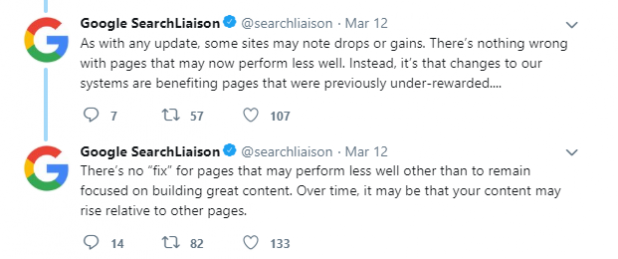Google use over 200 factors when deciding where to rank you in a Google Search. The algorithm utilizing these factors is a closely guarded secret. It’s also constantly changing. In fact, there are around 500-600 changes made to the algorithm every year.
But a few times each year Google releases a “broad core algorithm update” and some people get very happy, some people get very sad.
Imagine the daily updates as a little dash of paint here or there on a canvas. They’re barely perceptible.
Imagine the broad core updates as hurling a can of paint over the canvas. When they happen, people take notice.
Your site’s gains or losses can be pretty dramatic. Ask Pandora. Their visibility fell 28% overnight following the most recent broad core update.
But before we get into what’s changed, what’s changing and what you can do about it, let’s get some perspective.
Your Friendly Neighborhood Search Giant
Don’t be evil.
That’s still written at the end of Google’s corporate code of conduct, in spite of clickbait posts which state the contrary.
Well, Socrates said “the only good is knowledge and the only evil is ignorance”. And so, when it comes to Google’s algorithm, you would be forgiven for thinking that they’re being just a little bit evil.
Google keeps things pretty vague. And they keep it pretty quiet:

Okay. So, this guidance was given out in March. What does it say?

That’s still pretty vague. Some sites may note drops or gains. There’s nothing wrong if you’re performing less well. There’s no “fix”. But if you’ve just plummeted down the search engine ranking overnight, that’s not going to cut it.
Whether you’ve lost visibility, or you want to avoid losing it in the future, stick with me and I’ll show you that Google isn’t being nearly as coy as they look. How you can avoid a nasty tumble down the search engine, or how to clamber up its lofty heights, is out there. It’s just not that easy to wrap your fingers around.
Why Do Google Mess Around With Their Algorithm So Often?
Because it’s how they keep beating the opposition.
No, really.
Google achieved search engine dominance because their users got what they were looking for when they searched. This might sound simple, but it cuts to the heart of what their algorithm updates are all about: user experience.
Almost 75% of all search engine use is done through Google. It’s the kind of market dominance everyone dreams about. But if you’re the leader, you should never sleep soundly. If you’re wondering why Google is constantly tinkering with their algorithm, this is why. They must constantly improve user experience before someone else does a better job.
And if Google needed any reminders about staying ahead of the curve in a tech-savvy world, they can cast their eyes back to the rise, dominance and disastrous fall of Nokia.
Why Does Google’s Algorithm Matter To Me?
Well, because you want to rank as high as you can on Google search.
And, well, because of the numbers. The numbers are stark.
67% of web users won’t go past the five listings on a search engine results page.
Not only that, the first page of search engine results get 95% of all web traffic.
As your exact position in a Google search falls, your clickthrough rate (CTR) plummets. First position: 35% CTR, second position: 15% CTR, third position: 10%, and it gets uglier after that.
So, from your perspective, when Google says “there’s nothing wrong with pages that now perform less well” they are wrong. Absolutely, unequivocally, bet-your-bottom-dollar wrong.
Where organic searches are concerned, you need to be doing everything you can to rank highly.
Who Got Hurt And Why
The latest broad core update has been called assigned the name “Google Medic Update” by Barry Schwartz, a prolific search writer. Why? Because it hurt health/medical sites the very hardest.
We’re based in the UK, and the biggest UK losers in terms of Google visibility aside from Pandora were:
- Prevention.com
- News-medical.net
- Patient.info
- verywellhealy.com
- wales.nhs.com
Why these sites lost out will become clearer by the end of this article. But, for now, note the prevalence of health/medical sites and think what a user visiting them from Google might want to see.
Remember this above all else: Google care about their users clicking on a link and getting exactly what they expected. Their focus is on user experience. If Google screws that up, Bing and many other search engines are waiting in the wings.
Google’s Quest For High-Quality Content
So, here’s the deal. Google isn’t being evil. They’re not even being that vague. In fact, they’re behaving like someone on a date. Yes, it’s working. Yes, there’s chemistry. The signs are all there. But they’re not about to be the one to ask you back to their place. It’s coy, but it’s also pretty forthright at the same time.
Google know they live and die on providing their users with the right information as quickly as possible.
If you want to rank highly, you need to focus on making sure users get what they expect to get from your site. Google want what is called “high-quality content”. This isn’t new, and it’s been trundling to the front and center of Google’s algorithm for a very long time.
So What Can You Do?
Start with Google’s Quality Guidelines. It’s best to roll up your sleeves and get right in there, but the quick and dirty version goes as follows:
- Create your content for your audience – not a search engine
- Don’t try to trick anyone into coming to your page
- Differentiate yourself from other people within your niche
- Figure out how you provide value to your visitors: you’re the expert, the most cost-effective, etcetera.
Sounds pretty negative so far, doesn’t it?
It boils down to this: be the expert in your field, be in-depth and be original.
Health/medical sites that didn’t check these boxes were likely the ones who bore the full brunt of Google’s penalty hammer this time around.
You Want It Simpler
Fine. It’s time to stop thinking about ranking in Google’s search engine as a game that you can win or lose.
Find your unique selling point, differentiate yourself and offer value to your visitors.
If you worry too much about where the Google game is going, you will get caught out. If you focus on providing a fantastic user experience, you’ll be playing a different game altogether. And, better yet, it will be one that you can win.






